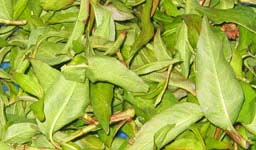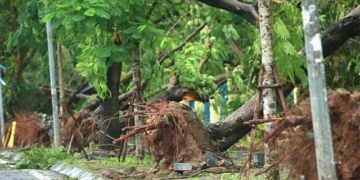Recently, there has been a significant rise in cases of large liver fluke disease among humans, according to Master Dao Hanh Nguyen, head of the outpatient department at the Institute of Malaria – Parasitology – Entomology.
 |
| It is essential to thoroughly wash all types of vegetables to eliminate liver fluke larvae (Image: Terebess) |
Prior to 2002, the institute had never treated any cases of large liver fluke disease. However, in the first three months of this year alone, there have been 60 inpatients, exceeding the hospital’s capacity of 20 beds. On April 20, there were also 12 patients admitted for this disease.
Dr. Nguyen explained that liver fluke larvae typically attach to aquatic vegetables such as Vietnamese coriander, watercress, bitter herbs, water spinach, and celery… Consuming these contaminated vegetables will undoubtedly lead to infection.
When the liver fluke has established itself in the body for a long time, it can cause abscesses, gradually destroying liver tissue. This condition can be fatal due to ruptured liver capsules, hemorrhage, or septic shock from peritonitis.
Dr. Nguyen noted that alongside the sudden increase in large liver fluke cases, there is also a high incidence of pork tapeworm larvae. As of April 20, there were 20 patients being treated for pork tapeworm infections at the institute.
These infections arise from consuming eggs of the pig tapeworm found in raw vegetables, contaminated water, food, and undercooked pork. Many patients contracted the disease by eating raw pork salad or partially cooked pork. The disease is prevalent in Bac Ninh, Bac Giang, Ha Nam, Nghia Hung (Nam Dinh), Thai Thuy (Thai Binh), Nga Son (Thanh Hoa), and Soc Son (Hanoi).
If detected late, the larvae can penetrate the intestinal mucosa and enter the bloodstream, making treatment difficult and potentially leaving lasting effects such as seizures and damage to the optic nerve, leading to permanent blindness.
In reality, the habit of washing raw vegetables with salt water is not very effective in removing fluke larvae. According to Dr. Nguyen, the best practice is to wash vegetables thoroughly under running water and soak them in salt water.
NGOC HA
To date, all the medication for treating large liver flukes, Triclabendazole (branded as Egaten 250mg), has been provided by the World Health Organization, allowing patients to receive the drug for free, as it is not available on the market. Due to the sudden spike in cases, the amount of medication distributed this year has been exhausted, necessitating the use of less effective alternatives. |


















































